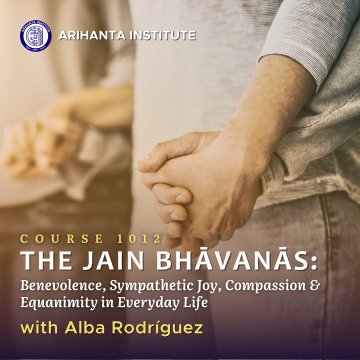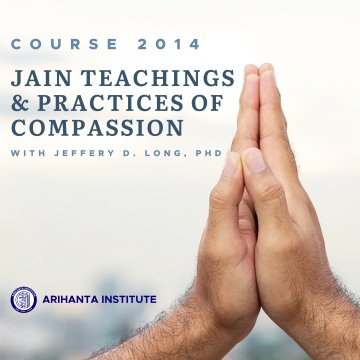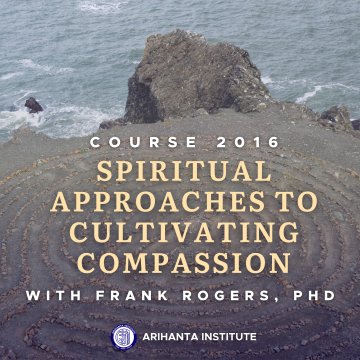Online Courses
Self-paced

1012 | The Jain Bhāvanās: Benevolence, Sympathetic Joy, Compassion, and Equanimity in Everyday Life
Added to cart
1012 | The Jain Bhāvanās: Benevolence, Sympathetic Joy, Compassion, and Equanimity in Everyday Life
Explore the meanings, history, and practical applications of the cultivation of the Jain virtues of benevolence towards all living beings (maitrī), sympathetic joy for the virtuous (pramoda), compassion for the afflicted (kāruṇya), and equanimity towards the unvirtuous (mādhyastha). Begin by defining each term according to Jain textual sources. Next, appreciate the moral significance of these virtues and its various applications. Finally, with this conceptualization and history in mind, bring your fresh and deeper understanding of these virtues into the present and apply them in daily life. This course includes comparative study of the bhāvanās as they are interpreted and practiced in other dharma traditions. Learning Objectives:Understand the relevance of the four bhāvanās in Jain ethics and soteriology.Critically consider their context, and compare with other religious traditions.Bring your own insight of the bhāvanās into the present and apply them in daily life.
$99.00 USD
Instructor
Self-paced

2014 | Jain Teachings & Practices of Compassion
Added to cart
2014 | Jain Teachings & Practices of Compassion
The Jain tradition is rightly famous for its teachings and practices of ahiṃsā, or nonviolence in thought, word, and action. Less well-known or well-understood is the Jain emphasis on karuṇā or dāyā—compassion. Even admirers of the Jain emphasis on nonviolence might ask whether the Jain ideal is merely one of avoiding harm or if there is a place for doing positive good for the welfare of other beings in this tradition. Given the strong emphasis in this tradition of not harming animals and practicing a vegetarian or vegan diet, some might also ask whether the practice of compassion specifically toward human beings is also important to Jains. The answer to both these questions is an emphatic yes. There is indeed a strong Jain emphasis on living compassionately, and specifically on treating our fellow humans with kindness. This course will explore Jain teachings and practices of compassion–including, but not limited to, compassion directed toward our fellow human beings. All suggested course readings are provided as links and pdfs throughout the course. Learning Objectives:Understand the foundations of compassionate living according to Jain teachings.Learn how the Jain tradition provides rich philosophical resources that encourage us to live compassionately.Learn how teachings and practices of compassion are lived out in the Jain community.
$99.00 USD
Instructor
Self-paced

2015 | Forgiveness as Compassion
Added to cart
2015 | Forgiveness as Compassion
Forgiveness or ‘Kṣamāpanā’ is arguably the most important virtue and practice, known to be synonymous to and vital for the practice of non-violence, compassion, and peace for individuals and the global community. As one of the most ancient religious traditions, Jainism is not only rich with the philosophical sources on the concept of forgiveness, but the Jain tradition also offers lived ways to practice forgiveness in our daily life. Learn the Jain way of forgiveness in conversation with non-violence, compassion, and peace.All suggested course readings are provided as links and pdfs throughout the course.Learning Objectives:Understand the foundational philosophy of forgiveness in the Jain tradition.Learn how the Jain tradition provides rich philosophical resources and practices that encourage us “to forgive” and “seek forgiveness.”Incorporate Jain virtues and practices into your own life and significantly contribute to creating a compassionate, non-violent, and peaceful world.
$99.00 USD
Instructor
Self-paced

2016 | Spiritual Approaches to Cultivating Compassion
Added to cart
2016 | Spiritual Approaches to Cultivating Compassion
This course explores compassion formation processes that are grounded in Western monotheistic spiritual traditions. These formation processes promote a spiritual path of radical compassion rooted in contemplative encounters with an all-inclusive sacred Source and embodied in compassionate action that extends toward all—one's self, one's neighbor, even one's enemies. This course does not so much study compassion; it explores how to cultivate a compassionate presence in the world through these spiritual traditions. All suggested course readings are provided as links or pdfs throughout the course.Learning Objectives:After taking this course, students will be able to:Understand how to cultivate a connection to a compassionate sacred Source asdescribed in monotheistic spiritual traditions.Understand how to cultivate compassion toward one’s self grounded in western spiritual sensibilities.Understand how to cultivate compassion toward others through western spiritual practices.
$99.00 USD
Instructor
Upcoming

2017 | Compassion to Self & Others in Jain Householder Life
Jain teachers have elaborated on sixty variants of the pan-Indian principle of ahiṃsā (non-violence) in their canonical texts. While physical non-violence—especially the avoidance of harm to any sentient being—is widely recognized both within and beyond the Jain tradition, other dimensions of ahiṃsā focus on fostering compassionate treatment toward not only one’s self but also to fellow humans. This course draws from the Śrāvaka Saṃbodha, a handbook on lay practices compiled by Ācārya Tulasī (1914–1997). This text outlines the qualities (guṇas) of lay disciples and provides practical, didactic guidance on religious conduct, encapsulating the ‘Jain way of life.’ Through these teachings, students will explore how responsible householders can contribute to a compassionate and harmonious society by integrating Jain ethical principles into everyday life. Course readings will be made available as links and PDFs throughout the duration of the course.Learning Objectives:• Examine the Śrāvaka Saṃbodha, a poetic text written in the vernacular (Hindi) and assess its contemporary relevance to ethical and compassionate living.• Understand the multifaceted meanings of compassion within Jain thought and analyze how it transcends conventional notions of kindness and non-violence.• Evaluate, using interdisciplinary approaches from social sciences (such as history and linguistics), the various methods Ācārya Tulasī employs in constructing and communicating the qualities of householders in Jainism
 Available for self-study on Monday, May 5, 2025.
Available for self-study on Monday, May 5, 2025.$99.00 USD
Instructor
Upcoming

2018 | Human Security as Compassion: Jain Perspectives on Global Challenges
Feeling safe is one of our biggest needs. But sometimes it seems like we live in an age of uncertainty and increasingly complex global crises. What then does it take today for human beings to feel and be safe?In this course you will learn how Jain thought and practice can speak to each of the seven areas of human security: Personal Security - Health Security – Food Security –Environmental Security – Economic Security – Political Security – Community Security. Human security is not merely a matter of technology and logistics and a task for states and big organizations. It can also be approached as value-based: helping others to feel and be safe as an act of compassion. Underlying the concept of human security is the desire to understand what each individual human being needs to be able to flourish and live a meaningful life. In the course we will discuss different ways of answering this question, from the United Nations sustainable development goals to the wisdom of the Jain scriptures, and how they can inform each other to address today’s global challenges. All suggested course readings are provided as links and pdfs throughout the course.Learning Objectives:Understand concepts connected to human security.Learn about compassionate Jain approaches to today’s global security challenges in both theory and practice.Develop the way you think about security, both your own and that of others.Get inspired for compassionate action that makes a difference in people’s lives.
 Available for self-study starting June 2, 2025.
Available for self-study starting June 2, 2025.$99.00 USD
Instructor
Upcoming

2019 | Interreligious Approaches to Compassion in Action
Added to cart
2019 | Interreligious Approaches to Compassion in Action
The Tattvartbhasya by Haribhadra describes Compassion as a feeling of mercy for those who are miserable. Compassion also known as Karuna or Anukampa is the most important principle not only to understand but more importantly to practice in everyday life. Learn how all religions preach compassion, and how the Jain tradition takes its own – a unique approach. Compassion remains a central point in understanding three main principles of Jain tradition Ahimsa (nonviolence), Anekantvad (multiplicity of views), and Aparigrah (nonpossessiveness). Understand the Jain way of practicing compassion and how other religions address the practice of compassion. Also learn the different ways one can be compassionate, as well as the challenges you will face in serving selflessly along with possible ways to overcome them.All suggested course readings are provided as links and pdfs throughout the course. Learning Objectives:Understand compassion/Karuna/Anukampa following Jain philosophyLearn compassion teachings by Christian, Islam, Hindu, Sikh, Jewish & Buddhist traditionsFind ways to practice compassion locally in your areaDiscover how to help people around the worldFind out how to be a compassionate giving human being
 Available for self-study on Monday, June 30, 2025.
Available for self-study on Monday, June 30, 2025.$99.00 USD
Instructor
Upcoming

2020 | Compassionate Food Systems for Planetary Healing
Added to cart
2020 | Compassionate Food Systems for Planetary Healing
The global food system is the single largest contributor to the ongoing ecological crisis and humanitarian crisis, impacting every one of the six planetary boundary transgressions that the Stockholm Resilience Center identified in 2023. This necessitates a transformation to a compassionate food system that meets the nutritional needs of all human beings while ensuring that these planetary boundary transgressions are mitigated. In this class, we will examine the architectures of compassionate food systems and how they can be implemented as the foundation of a holistic transformation from the climate heating phase to the climate healing phase of our civilization.Learning Objectives:By the end of this course, students will be able to:Understand the Urgency: Articulate the critical need for transforming foodsystems to address ecological crises and social injustices, including theimplications of animal agriculture on planetary boundaries and human health.Define Compassionate Food Systems: Explain the principles of acompassionate food system and its potential to provide nourishing food for allwhile operating within the limits of planetary boundaries.Analyze Implementation Strategies: Assess the political and economictransformations required to implement compassionate food systems effectively.Facilitate Transformation: Identify grassroots initiatives and strategies toovercome resistance and facilitate the transition to a compassionate foodsystem.
 Available for self-study on Monday, August 4, 2025.
Available for self-study on Monday, August 4, 2025.Free
Instructor
Enrollment Options
14-DAY FREE TRIAL
- Free, unlimited access to our self-paced courses for 14-days.
- Already used your free trial? Enroll in our Monthly or Annual Membership options at anytime and continue learning immediately!
MONTHLY MEMBERSHIP
- $45 USD / Month
- Immediate access to course #### | Name.
- Unlimited access to our live and self-paced courses for one month, with month-to-month auto rollover.
- Excludes graduate seminars and language courses.

 Alba Rodriguez Juan
Alba Rodriguez Juan Jeffery Long, PhD
Jeffery Long, PhD Venu Mehta
Venu Mehta Frank Rogers, PhD
Frank Rogers, PhD Shivani Bothra
Shivani Bothra Melanie Barbato, PhD
Melanie Barbato, PhD Nitin Shah
Nitin Shah Sailesh Rao
Sailesh Rao